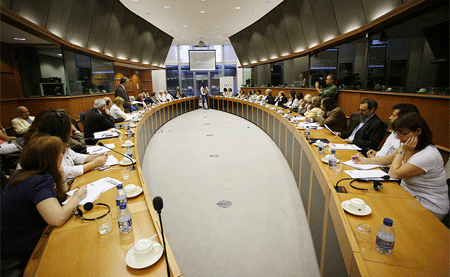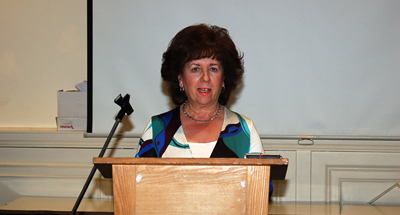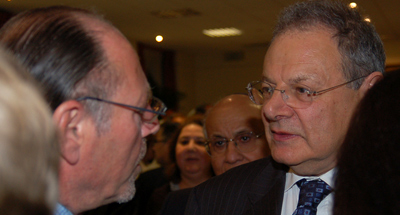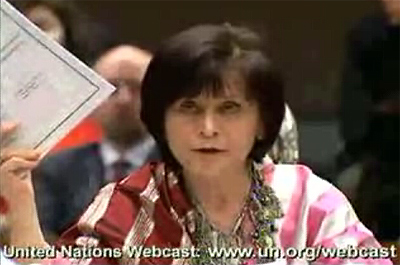|
|
 |
 |
 |
 |
| EUROPEAN
PARLIAMENT HEARS JEWISH REFUGEE |
|
(BRUSSELS)
"We lost everything we had, we could not even
take our family photos," declared Edwin Shuker,
a displaced Jewish refugee from Iraq at the first-ever
hearing in the European Parliament in Brussels, Belgium
on July 1, 2008.

The
hearing in the European Parliament was organized by
Paulo Casaca, MEP (Member of the European
Parliament), with the European Friends of Israel
and B'nai B'rith in association with
Justice for Jews from Arab Countries (JJAC),
the international coalition of organizations that are
seeking justice for the up to one million Jews displaced
from Arab countries. Among the other speakers were Moise
Rahmani from Belgium (born in Cairo) and Prof. Carole
Basri of the USA (family from Baghdad).
Casaca
defended the cause of all ethnic and religious minorities
in the Middle East. He indicated that he deplored the
fact that the rights of Jewish and Christian refugees
today are virtually unrecognized by Europeans. Prof.
Basri, an attorney who teaches law at the University
of Pennsylvania, said that the criteria for ethnic
cleansing is one that can honestly be used to describe
the political measures that were put in place, to displace
the Jewish population in Arab countries that never represented
a military threat. Prof. Basri outlined the legal and
historical arguments supporting the case to recognize
the Jews of Arab countries as bona fide refugees
under international law and called for 'Truth and Reconciliation'
hearings on the subject.
Moise
Rahmani introduced the background to the displacement
of Jews from their ancestral birthplace as detailed
in his book L'exode Oublie.

Testifying
at the hearing in the European Parliament were:
Moise Rahmani (Belgium), Edwin Shuker (UK) and Carole
Basri (USA)
Shuker,
a UK resident and President of Justice for Jews from
Arab Countries, gave a detailed account of the "black
period" that his family suffered through in
Iraq under the nationalist Baathist regime. He said,
"Two refugee populations emerged from the Arab-Israeli
conflict, both suffered, both were victims and justice
requires equal consideration and redress." "In
passing Resolution 185 the US congress recognized this
and we appeal to the European Parliament to deliver
a similar message," he added.
The
European Parliament is the only directly elected parliamentary
institution of the European Union (EU). Together with
the Council of the European Union, it has been described
as one of the most powerful legislatures in the world.
Justice
for Jews from Arab Countries is an international
coalition of major Jewish communal organizations operating
to ensure that justice for Jews from Arab countries
assumes its rightful place on the international political
agenda and that their rights be secured as a matter
of law and equity.
|
| HEARING
IN THE BRITISH HOUSE OF LORDS |
|
(LONDON)
June 25, 2008 - In his appearance before an overflow
gathering at the House of Lords, Canadian MP Irwin Cotler
declared that: "Had the UN Partition Resolution
been accepted sixty years ago, there would have been
no Arab-Israeli war - no refugees, Jewish or Arab. –
and none of the pain and suffering of these last sixty
years. Indeed, we would have been celebrating the sixtieth
anniversary of both the State of Israel and the State
of Palestine."

Cotler
continued: "Yet the pain and plight of 850,000
Jews uprooted and displaced from Arab countries –
not only a forgotten, but a forced exodus, – has
been expunged and eclipsed from both the Middle East
peace and justice narratives these past sixty years."
The
meeting was organized by Justice for Jews from
Arab Countries (JJAC) in association with the
Board of Deputies of British Jews.
Parliamentarians
in attendance:
-Lord
Anderson of Swansea (Labour Peer)
-Lord Hylton (Crossbench Peer)
-Lord Roberts of Llandudno (Welsh Liberal Democrat
Peer)
-Lord Selkirk of Douglas (Member of the Scottish Parliament)
-Lord Stone of Blackheath (Labour Peer)
-Baroness Whitaker (Labour Peer)
-Lousie
Ellman (Member of Parliament)
-John Mann (Member of Parliament)
-Richard Spring (Member of Parliament)
-Bob Spink (Member of Parliament)

Listening
intently to the presentation was
Member of Parliament Louise Ellman (seated third from
left)
Cotler
submitted evidence from a report entitled Jewish
Refugees from Arab Countries: The Case for Rights And
Redress, which documented for the first time
a pattern of state-sanctioned repression and persecution
in Arab countries - including Nuremberg-like laws -
that targeted its Jewish populations, resulting in denationalization,
forced expulsions, illegal sequestration of property,
arbitrary arrest and detention, torture and murder.
He concluded this part of his testimony by stating that:
"This is a story that has not been heard. It
is a story that has not yet even been told. It is a
truth that must now be acknowledged."
Professor Cotler then set forth a nine-point action
plan for human rights and refugee rights – and
a just and lasting peace in the middle-East – which
included:
- First,
it must be appreciated that while justice has long
been delayed, it must no longer be denied. The time
has come to rectify this historical injustice, and
to restore the plight and truth of the 'forgotten
exodus' of Jews from Arab countries to the Middle
East narrative from which they have been expunged
and eclipsed these 60 years.
- Second,
remedies for victim refugee groups - including rights
of remembrance, truth, justice and redress - as mandated
under human rights and humanitarian law - must now
be invoked for Jews displaced from Arab countries.
- Third,
in the manner of duties and responsibilities, each
of the Arab countries - and the League of Arab States
- must acknowledge their role and responsibility in
their double aggression of launching an aggressive
war against Israel and the perpetration of human rights
violations against their respective Jewish nationals.
The culture of impunity must end.
- Fourth,
the Arab League Peace Plan of 2002 should incorporate
the question of Jewish refugees from Arab countries
as part of its narrative for an Israeli-Arab peace,
just as the Israeli narrative now incorporates the
issue of Palestinian refugees in its vision of an
Israeli-Arab peace.
- Fifth,
on the international level, the U.N. General Assembly
- in the interests of justice and equity - should
include reference to Jewish refugees as well as Palestinian
refugees in its annual resolutions; the U.N. Human
Rights Council should address, as it has yet to do,
the issue of Jewish as well as Palestinian refugees;
U.N. agencies dealing with compensatory efforts for
Palestinian refugees should also address Jewish refugees
form Arab countries.
- Sixth,
the annual Nov. 29th commemoration by the United Nations
of the International Day of Solidarity with the Palestinian
People should be transformed into an International
Day of Solidarity for a Two-State Solution - as the
initial 1947 Partition Resolution intended - including
solidarity with all refugees created by the Israeli-Arab
conflict.
- Seventh,
jurisdiction over Palestinian refugees should be transferred
from UNWRA to the United Nations High Commissioner
for Refugees. There was no justification then - and
still less today - for the establishment of a separate
body to deal only with Palestinian refugees, particularly
when that body is itself compromised by its incitement
to hatred and violence, as well as its revisionist
teaching of the mid-East peace and justice narrative.
- Eighth,
any bilateral Israeli-Palestinian negotiations - which
one hopes will presage a just and lasting peace -
should include Jewish refugees as well as Palestinian
refugees in an inclusive joiner of discussion.
- Ninth,
during any and all discussions on the Middle East
by the Quartet and others, any explicit reference
to Palestinian refugees should be paralleled by a
reference to Jewish refugees from Arab countries.
Cotler
called on the UK Government to use its voice, vote,
and participation in matters relating to issues of mid-East
refugees to ensure that any reference to Palestinian
refugees is accompanied by a similarly explicit reference
to Jewish refugees from Arab countries.

Prof.
Irwin Cotler, honorary chair of Justice for Jews
from Arab Countries, speaking to members
of the House of Commons and the House of Lords. Seated
is David Matas, honorary legal council
of Justice for Jews from Arab Countries, who
chaired the event.
"Simply
put," Cotler concluded, "the exclusion
and denial of rights and redress to Jewish refugees
from Arab and countries will prejudice authentic negotiations
between the parties and undermine the justice and legitimacy
of any agreement. Let there be no mistake about it.
Where there is no remembrance, there is no truth; where
there is no truth, there will be no justice; where there
is no justice, there will be no reconciliation; and
where there is no reconciliation, there will be no peace
–which we all seek."
Click
Here for Full Testimony by Prof. Irwin Cotler, MP

Click
Here for Full Testimony by David Matas

|
| JJAC
FOUNDING CONGRESS HELD IN LONDON |
|
Justice
for Jews from Arab Countries (JJAC)
held its its Founding Congress on June 23-25, 2008 in
London, England. Some fifty delegates from 10 countries
convened to constitute Justice for Jews from Arab
Countries as an independent, non-profit organization
and to establish the structures to govern JJAC's operations.
(Click
here for a list of organizations that participated)
The
Congress elected a Board of Directors, including: Rabbi
Dr. Elie Abadie (USA), Elise Abadie (USA), Sylvain Abitbol
(Canada), Jean-Pierre Allali (France), Lili Amior (UK),
Sydney Assor UK, Shlomo Bakhash (USA) Prof. Carole Basri
(USA), Dr. David Bensoussan (Canada), Serge Cattan (Belgium),
Gladys Daoud (Canada), Anders Engstrom (Sweden), Elias
Fatal (UK), Emile Fattal (Canada), Eric Fusfield (USA),
Prof. Henry Green (USA), Nessim Hamaoui (Brazil), Annie
Hodara (Switzerland), Paul Hodara (Switzerland), Lyn
Julius (UK), Raphael Luzon (UK), David Matas (Canada),
Linda Menuhin (Israel), Prof. Shmuel Moreh (Israel),
Moise Rahmani (Belgium), Joël Rubenfeld (Belgium),
Maurice Shohet (USA), Edwin Shuker (UK), Regina Waldman
(USA).
Also
elected were the Officers who comprise the Executive
Committee. Elected for a one year term of office were:
Edwin Shuker, President; Serge Cattan, Chairman of the
Board; Regina Waldman, Vice-President; Rabbi Dr. Elie
Abadie, Vice-President; Jean-Pierre Allali, Vice-President;
Sylvain Abitbol, Treasurer; Nessim Hamoui, Secretary.
Featured
speakers included:
- Renowned
historian Sir Martin Gilbert, CBE, D.Litt. opened
the Congress at the Montefiore Hall with the lecture,
"Historical Narrative and the UK’s Response
to Middle East Refugees."
- The
Honorable Irwin Cotler, PC, OC, MP, former Canadian
Minister of Justice, delivered a stirring address
to delegates who attended a briefing in the British
House of Lords; and
- Mordechai
Ben Porat, who directed Operation Ezra and
Nechemia, told his personal account of the
role he played in the liberation, and mass exodus,
of over 130,000 Jews from Iraq who were resettled
in Israel.
As
part of the proceedings, delegates were briefed on JJAC
activities and accomplishments worlwide; debated at
length issues of JJAC’s mandate; operations in
Israel; external relations with other organizations;
adopted a set of by-laws; and discussed fundraising
opportunities.
Meetings
were held in the offices of the Board of Deputies
of British Jews and at the Sephardic Center
at the Spanish and Portuguese Synagogue.
The next meeting of the Board of Directors has been
tentatively scheduled for November 2008 in Israel.

Flo
Kaufmann, Vice President of the Board of Deputies
of British Jews &
Chairperson of the European Jewish Congress Board
of Governors, introducing Sir Martin Gilbert

Sir
Martin Gilbert speaking with Prof. Henry Green (USA)
of University of Miami

Henry
Grunwald QC (standing on far right), President of the
Board of Deputies of British Jews, addressing
the JJAC Congress opening plenary. Listening intently
are (L to R), Stan Urman (Exec. Vice-President of JJAC),
Serge Cattan (Belgium), Jon Benjamin, Chief Executive
of the Board of Deputies of British Jews (standing),
Elias Fattal (UK), Amb. Yossi Ben-Aharon (Israel) and
Regina Waldman (USA)

One
of several working meetings

Rabbi
Dr. Elie Abadie of NYC who chaired JJAC's Nomination
Committee,
presenting his report to the JJAC Congress Plenary
Media
Coverage of the Hearing
More
photos from the London Congress
|
| JJAC
TESTIFIES AT UN HEARING IN GENEVA |
|
For
decades, the United Nations has ignored the plight
of Jewish refugees from Arab countries. Now they are
no longer be able to do so. On March 18, 2008, for the
first time ever, appearing in Geneva at the United
Nations Human Rights Council, was a Jewish refugee
from an Arab country, Regina Bublil-Waldman, who fled
Libya in 1967, in fear of her life.

Also
appearing was Sylvain Abitbol, Co-President of the
Canadian Jewish Congress who is originally from
Morocco and Stanley A. Urman, Exec. Vice-President of
Justice for Jews from Arab Countries.
Celebrating
her heritage, Mrs. Bublil-Waldman appeared wearing her
grandmother's Libyan wedding dress. At the same time,
she was 'mourning'the loss of her heritage, as in 1948,
there were 36,000 Jews living in Libya. Today, there
are none left. Ms. Bublil-Waldman ultimately resettled
in the United States where she founded JIMENA
(Jews Indigenous to the Middle East and North Africa).

Click
here to watch Regina Waldman's testimony
Mr.
Abitbol brought a message of hoped-for peace and reconciliation.
He recalled that King Muhammad V intervened to protect
Jews living in Morocco from the Nazi regime. While recognizing
the historical plight faced by Jews who lived for millennia
in Arab countries, Mr. Abitbol expressed the hope that
these displaced Jews can serve as an important bridge
to the Arab world, much as he does now in his business
and community life.
A
Report entitled "Justice for Jewish Refugees
from Arab Countries: The Case for Rights and Redress"was
presented to the United Nations Human Rights Council.
Published by Justice for Jews from Arab Countries,
the Report contains documents - recently discovered
in the U.N. archives - that reveal a pattern of state-sanctioned
oppression that precipitated the mass exodus of Jews
from 10 Arab countries.

"The
Report discloses the manner in which the U.N. excluded
Jewish refugees from Arab countries from the justice
and peace agenda" said Stanley Urman, Exec.
Vice-President of Justice for Jews from Arab Countries.
"This is not just a case of justice delayed,
but justice denied."
Read
the Report: The Case for Rights and Redress
Visit
the UN Watch Website

|
|
|
|

